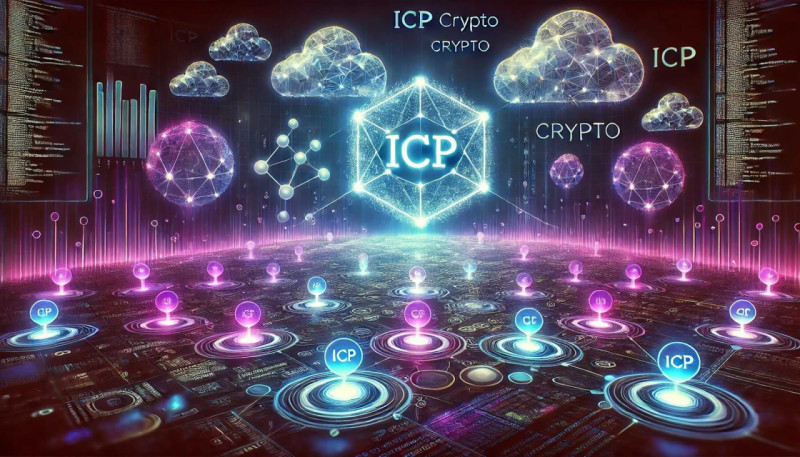
Introduction
The world of cryptocurrency continues to evolve rapidly, and one of the most innovative entrants is ICP (Internet Computer Protocol) crypto. Launched by the DFINITY Foundation, ICP aims to revolutionize the way the internet functions by enabling decentralized web services and applications directly on the blockchain. Unlike traditional cryptocurrencies like Bitcoin and Ethereum, ICP is designed to provide a scalable, secure, and efficient foundation for building and hosting websites, apps, and data services. As a result, ICP is often included in discussions of the utility cryptocurrency list, given its functionality beyond simple digital currency use cases. This groundbreaking technology has the potential to reshape the future of the internet, making it more decentralized and less reliant on centralized cloud services.
What is ICP Crypto?
ICP (Internet Computer Protocol) cryptocurrency is a groundbreaking blockchain technology developed by the DFINITY Foundation. Officially launched in May 2021, ICP aims to transform the internet by enabling decentralized web services and applications on a global scale. Unlike traditional cryptocurrencies, which primarily serve as digital currencies or support financial transactions, ICP’s primary function is to create a decentralized internet that can host websites, applications, and data without reliance on traditional cloud providers.
History & Background
ICP was launched with the ambitious goal of decentralizing the web itself. The DFINITY Foundation, founded by Dominic Williams in 2016, spent several years developing the technology behind ICP. The core vision is to scale web services by allowing developers to build and deploy decentralized applications (dApps) directly on the Internet Computer, a blockchain-based platform. This decentralized network can handle almost limitless computations and storage, solving issues of scalability that have plagued earlier blockchain platforms like Ethereum.
Key Features
- Scalability. One of ICP's standout features is its ability to scale efficiently. It processes data at web speed and can handle an enormous number of applications and websites simultaneously without slowing down, thanks to its decentralized nature.
- Decentralized Storage. ICP allows data to be stored in a decentralized manner, bypassing traditional cloud providers. This ensures that the applications built on ICP can run independently, without the need for centralized infrastructure.
- Chain-Key Technology. ICP’s unique chain-key technology enables the network to process and finalize transactions rapidly. This innovation allows the system to maintain security and decentralization while scaling efficiently.
Unique Aspects
What truly sets ICP apart from other blockchain projects is its focus on creating a decentralized version of the internet. While many blockchains prioritize financial use cases, ICP's vision extends far beyond that by creating an ecosystem where the internet is no longer controlled by large tech companies. This decentralized approach provides developers and users with greater control, transparency, and privacy.
What is ICP Crypto and How Does It Work?
ICP (Internet Computer Protocol) operates on a sophisticated decentralized network that enables websites, applications, and other digital services to run on blockchain technology without relying on centralized cloud servers. Its primary aim is to create a seamless, scalable, and efficient decentralized internet. This section dives into the key mechanics of how ICP operates within the Internet Computer ecosystem, from its cryptographic innovations to the infrastructure that supports the network.
Technical Overview
At its core, the Internet Computer consists of a decentralized network of data centers (nodes) spread across the globe. These nodes collectively provide computational power, allowing the Internet Computer to run applications and services with near-instant finality. Unlike traditional blockchains, where transaction speeds and scalability are common issues, ICP’s architecture is designed to handle vast numbers of operations at web speed while maintaining security, decentralization, and efficiency.
The Internet Computer allows developers to deploy decentralized applications (dApps) in a way similar to traditional web development, but with the added benefits of decentralization, security, and reduced costs over time. This is made possible through several technological innovations unique to ICP.
The Role of Nodes
Nodes are the backbone of the Internet Computer. These independent nodes are run by data centers around the world, forming the physical infrastructure that supports the network. Each node contributes computing power to maintain the decentralized nature of the system.
In the ICP network, nodes work together to process transactions, run applications, and store data securely. Importantly, these nodes communicate using chain-key cryptography, which allows for extremely fast transaction processing and consensus without sacrificing decentralization or security. Nodes also ensure network stability and security by validating transactions and maintaining the integrity of the blockchain.
Canisters and Smart Contracts
ICP introduces an advanced form of smart contracts called canisters. A canister is a computational unit that bundles both code and state (data), providing a more versatile and scalable option for building decentralized applications (dApps). Traditional smart contracts, like those used on Ethereum, often face issues related to gas fees, speed, and scalability as the network grows.
Key differences between canisters and traditional smart contracts:
- Scalability. Canisters can scale far more effectively than typical smart contracts. They allow developers to deploy complex applications that run efficiently even under high user demand.
- Storage & Processing. Canisters not only process transactions but also store data persistently. This gives developers the flexibility to build apps that can store large datasets, such as social media platforms, on the blockchain.
- Ease of Use. Canisters simplify the deployment of dApps, enabling developers to easily write code in popular programming languages and run it on the Internet Computer network without significant barriers.
Using canisters to build dApps provides the advantage of lower costs, greater speed, and enhanced scalability, making ICP ideal for hosting a variety of decentralized services.
Chain-Key Technology
ICP’s groundbreaking chain-key technology is a cryptographic advancement that plays a crucial role in the network’s performance. This technology allows the Internet Computer to scale without becoming overly centralized or insecure, which is a common problem in many blockchain networks.
Key aspects of chain-key technology:
- Speed. Chain-key technology enables the network to finalize transactions in milliseconds, making it much faster than traditional blockchains that rely on proof-of-work or proof-of-stake consensus mechanisms.
- Single Public Key. The entire network operates under a single public key, allowing it to interact with external systems like other blockchains while maintaining decentralization.
- Node Security. Chain-key technology ensures that even if some nodes are compromised, the overall integrity of the network remains intact, providing robust security.
Internet Computer Consensus Protocol
The consensus protocol used by ICP ensures that transactions are processed quickly and securely across the decentralized network. Unlike proof-of-work or proof-of-stake models, ICP employs a unique consensus model that enables it to reach agreement on network operations with a high degree of efficiency.
Key features of the consensus protocol:
- Random Beacon. This mechanism generates randomness in a decentralized manner, allowing the network to select leaders and schedule transactions securely and fairly.
- Threshold Signatures. ICP uses threshold signatures to confirm transactions. This method reduces the computational load while ensuring security, as it requires multiple nodes to agree on a transaction before it is finalized.
- Finality. Transactions on the ICP network achieve near-instant finality, meaning they are irreversible once confirmed, significantly improving both the speed and security of operations.
ICP’s technological innovations—such as canisters, chain-key technology, and its unique consensus protocol—enable the Internet Computer to operate at web speed while maintaining the core principles of decentralization and security. These features make ICP a standout in the world of blockchain technology, offering a platform that has the potential to transform not only the internet but also the way digital services are built and maintained.

ICP Crypto vs. Other Cryptocurrencies: What is ICP Crypto
In the rapidly evolving world of cryptocurrencies, it’s important to understand how different projects like ICP (Internet Computer Protocol) compare to major players such as Bitcoin and Ethereum. Each blockchain has its unique strengths and use cases, making it essential to evaluate them based on key factors like transaction speed, scalability, governance models, energy efficiency, and security. By comparing ICP to well-known cryptocurrencies, we can better understand its unique value proposition in the blockchain ecosystem.
Comparison Table
| Feature | ICP | Bitcoin | Ethereum | Polkadot |
| Transaction Speed | Web-speed | 10 minutes/block | 15 sec/block | Sub-second |
| Scalability | Highly scalable | Limited | Moderate | High |
| Governance Model | DAO-based | No governance | Ethereum 2.0 upgrade | On-chain governance |
| Energy Efficiency | Low energy use | High (Proof of Work) | Medium (Proof of Stake) | Low |
| Use Cases | dApps, web services | Digital currency | DeFi, smart contracts | Cross-chain projects |
| Security Model | High security | High (Proof of Work) | High (Proof of Stake) | High |
Analysis of Comparison
- Transaction Speed. ICP stands out with web-speed transaction processing, significantly faster than Bitcoin's 10-minute block time and Ethereum’s 15-second block time. This speed makes ICP ideal for hosting scalable web applications, whereas Bitcoin is primarily suited for digital currency transactions.
- Scalability. ICP’s highly scalable infrastructure allows it to handle vast amounts of data and applications without slowing down, thanks to its decentralized model. In contrast, Bitcoin’s scalability is limited, and Ethereum's scalability is only moderately improved with Ethereum 2.0, making ICP better suited for large-scale decentralized apps (dApps).
- Governance Model. ICP utilizes a DAO-based governance system, enabling decentralized decision-making, which contrasts with Bitcoin’s lack of formal governance. Ethereum 2.0 is moving toward an upgrade, and Polkadot uses on-chain governance, showing that governance models vary significantly across different platforms.
- Energy Efficiency. ICP operates with low energy consumption due to its advanced cryptographic techniques, while Bitcoin is energy-intensive because of its Proof of Work model. Ethereum has moved to Proof of Stake, improving energy efficiency, but ICP’s low energy use remains a standout feature.
- Use Cases. While Bitcoin’s primary function is digital currency, ICP is focused on supporting decentralized web services and applications. Ethereum offers smart contracts and decentralized finance (DeFi), while Polkadot specializes in cross-chain projects. ICP’s diverse use cases set it apart as a blockchain for web services.
ICP’s unique features, particularly its speed, scalability, and energy efficiency, make it a compelling choice for decentralized web services and dApps compared to Bitcoin, Ethereum, and Polkadot.
Key Use Cases of ICP Crypto: What is ICP Crypto
The Internet Computer Protocol (ICP) presents a variety of revolutionary use cases, pushing the boundaries of what blockchain technology can achieve. Its design enables developers to build scalable decentralized applications (dApps), businesses to create enterprise-level solutions, and offers innovations in smart contracts and social media. Below are some key areas where ICP is making significant strides.
Decentralized Apps (dApps)
One of the primary use cases of ICP is in the development of scalable decentralized applications (dApps). Unlike traditional blockchains, which face challenges in speed, scalability, and high transaction fees, ICP offers an environment where developers can build dApps that perform at web speed without compromising decentralization.
Developers are leveraging ICP to create a range of dApps across different sectors. For example, OpenChat, a decentralized messaging application, allows users to communicate without relying on a central authority. This ensures greater privacy and security. Another notable dApp is DSCVR, a decentralized social media platform where users control content and data, marking a significant shift from traditional centralized social platforms.
ICP's ability to process transactions in milliseconds makes it highly attractive for dApps that need to scale rapidly. The low transaction costs also make it feasible to develop applications for mass use, unlike Ethereum, where high gas fees can discourage large-scale adoption.
Enterprise Applications
ICP is also gaining traction in the enterprise sector. Businesses can leverage the ICP network for a variety of enterprise-level solutions, including cloud storage, data management, and internet services. With ICP’s decentralized infrastructure, companies can host critical services without relying on centralized cloud providers like Amazon Web Services or Google Cloud, reducing costs and eliminating single points of failure.
One example of ICP's enterprise use is CanDB, a decentralized database built on ICP. This solution provides scalable, secure data storage that can be used for enterprise-grade applications. By adopting decentralized cloud services, businesses can benefit from enhanced security, transparency, and lower operational costs.
A key case study is the use of ICP for decentralized web hosting. Unlike traditional hosting services, which can be vulnerable to downtime or censorship, ICP allows businesses to host websites and services in a decentralized manner, ensuring continuous availability and resilience.
Smart Contracts and Canisters
ICP takes a unique approach to smart contracts with its use of canisters, which bundle both code and state in a scalable and efficient way. Canisters differ from traditional smart contracts in that they are far more versatile and can handle more complex applications while scaling smoothly as usage increases.
For instance, canisters are used to build decentralized finance (DeFi) applications, where they allow for rapid, secure execution of financial transactions. This makes ICP an attractive platform for developers looking to create DeFi solutions that require high throughput and low latency.
An example of an application relying on ICP’s smart contract capabilities is the Internet Identity service, which allows users to log in securely and manage their identities without relying on centralized authorities. This innovation opens the door for decentralized authentication systems, paving the way for a more secure and privacy-focused web.
Social Media and Web Services
ICP is poised to revolutionize social media and web services by offering fully decentralized platforms. Unlike centralized social media platforms that control user data and content, ICP enables decentralized alternatives where users maintain full ownership of their data and can participate in decision-making processes.
Projects like Distrikt, a decentralized professional networking platform, demonstrate how ICP can power next-generation social media. Distrikt allows users to post content, build networks, and interact without any intermediary or central authority, ensuring data privacy and freedom from censorship.
By enabling decentralized web services, ICP provides an alternative to the current centralized internet dominated by a few large corporations. Its potential to host websites, applications, and social platforms on a blockchain means that it can facilitate a more open, transparent, and censorship-resistant internet.
ICP’s wide range of use cases—spanning dApps, enterprise solutions, smart contracts, and decentralized social media—demonstrates its versatility and potential to disrupt traditional centralized systems. Its technology empowers developers, businesses, and users to create and interact with decentralized applications that are fast, scalable, and secure.

ICP Crypto Price and Market Performance: What is ICP Crypto
Historical Price Trends
ICP (Internet Computer Protocol) made a significant splash in the cryptocurrency market when it launched in May 2021, with its price debuting at around $700. However, its early price surge was short-lived, as ICP experienced sharp volatility soon after its release. By June 2021, the price had dropped to below $100, reflecting the broader volatility in the cryptocurrency market and speculation-driven trading.
Key events have influenced ICP’s price movements, including technological advancements, new partnerships, and broader market trends. For instance, during the bullish crypto market in late 2021, ICP saw spikes alongside other major cryptocurrencies, reaching around $60 by November 2021. However, following global regulatory crackdowns on cryptocurrencies and the general market correction in 2022, ICP’s price declined, dropping as low as $5 by mid-2022.
Factors Influencing Price
Several factors have influenced ICP's price:
- Unique Technology. ICP’s novel approach to decentralized web services and smart contracts has generated significant interest. Its capacity for web-speed performance and scaling continues to attract developers and businesses, which boosts investor confidence.
- Adoption Rates. The adoption of the Internet Computer for decentralized applications (dApps) and enterprise solutions has helped stabilize its price. Increased use cases and growing dApp ecosystems tend to positively impact ICP's valuation.
- Partnership Deals. Strategic partnerships with companies and projects within the blockchain space have also driven price action. For instance, new collaborations with DeFi and NFT projects on the Internet Computer platform often result in short-term price surges.
- External Factors. Broader market trends, including regulatory changes, interest in decentralized technologies, and macroeconomic factors such as inflation, have affected ICP’s price. Regulatory news from China and the U.S., in particular, has caused significant price fluctuations across the entire crypto market, including ICP.
Current Price and Market Cap
As of today, ICP is trading at around $4.50 - $6, with a market cap of approximately $1.5 billion, placing it within the top 40 cryptocurrencies by market capitalization. The price has stabilized following its steep decline from its initial highs, with gradual growth as more projects are built on the platform.
Future Predictions
Looking forward, experts remain cautiously optimistic about ICP's future. Some predict that as the platform continues to attract developers and its dApp ecosystem expands, ICP could regain upward momentum, potentially reaching $20–$30 in the next few years. Much will depend on continued innovation, partnerships, and broader market recovery. On the flip side, the highly competitive nature of the blockchain space and macroeconomic uncertainties mean ICP’s price could continue to face volatility.
What is ICP Crypto: How to Buy and Store
Where to Buy ICP
ICP (Internet Computer Protocol) is available for purchase on several major cryptocurrency exchanges. Some of the leading platforms where you can buy ICP include:
- Binance. One of the largest and most popular exchanges globally, Binance offers ICP with various trading pairs (such as ICP/USDT, ICP/BTC).
- Coinbase. As a beginner-friendly exchange, Coinbase allows users to purchase ICP directly using fiat currencies (USD, EUR, etc.).
- Kraken. Known for its strong security measures, Kraken provides ICP with multiple trading pairs, offering a simple interface for new users.
- KuCoin. Another widely used platform, KuCoin offers ICP and features lower transaction fees.
Step-by-Step Guide for Purchasing ICP
- Create an Account. Sign up for an account on your chosen exchange (e.g., Binance, Coinbase). Complete the necessary identity verification (KYC).
- Deposit Funds. Fund your account with either fiat currency or another cryptocurrency like Bitcoin or Ethereum.
- Search for ICP. In the exchange’s market section, search for ICP. You’ll typically find it listed alongside popular pairs such as ICP/USDT, ICP/BTC, or ICP/USD.
- Place an Order. Select the desired trading pair, and place a market or limit order to buy ICP. For beginners, a market order is straightforward as it executes immediately at the current price.
- Securely Store ICP. Once purchased, transfer your ICP from the exchange to a secure wallet for long-term storage.
Storage Solutions
When it comes to storing ICP, you have two main options: hot wallets and cold wallets.
- Hot Wallets (Online Storage). Hot wallets are internet-connected wallets that allow you quick access to your cryptocurrency. They are typically offered by exchanges or third-party wallet providers. Some popular options include:
- Network Nervous System (NNS) Wallet. Specifically designed for ICP, this wallet is integrated with the Internet Computer blockchain and allows users to interact with governance and stake ICP tokens.
- Exodus Wallet. A user-friendly wallet that supports multiple cryptocurrencies, including ICP.
- Trust Wallet. A mobile wallet that offers easy storage and quick access to ICP.
- Pros. Easy access, convenient for frequent transactions.
- Cons. Vulnerable to hacking due to internet connectivity.
- Cold Wallets (Offline Storage). Cold wallets are physical devices or software that remain offline, making them much safer from online threats. These are ideal for long-term storage.
- Ledger Nano X. A hardware wallet compatible with ICP, providing top-tier security by keeping your private keys offline.
- Pros. Enhanced security, protection from hacks.
- Cons. Less convenient for frequent transactions, requires initial setup.
Security Tips
To ensure the safe storage of your ICP, follow these best practices.
- Two-Factor Authentication (2FA). Always enable 2FA on your exchange and wallet accounts to add an extra layer of security.
- Private Key Management. Never share your private keys with anyone. Store them in a secure, offline location, preferably in multiple copies.
- Multi-Signature Options. Use multi-signature wallets where multiple keys are required to authorize transactions. This adds an extra layer of protection.
By following these steps and tips, you can buy and securely store your ICP, safeguarding it from potential threats.

The Future of ICP Crypto: What is ICP Crypto
Potential for Growth
The future of ICP (Internet Computer Protocol) holds significant potential for growth, largely due to its unique position as a blockchain focused on decentralized web services and applications. As blockchain use cases continue to expand, ICP is well-positioned to capitalize on the growing demand for scalable, decentralized solutions that extend beyond financial transactions to include decentralized apps (dApps), cloud storage, and more. ICP's ability to handle large-scale applications at web speed gives it a competitive edge in industries like social media, cloud services, and enterprise solutions.
The DFINITY Foundation, which developed ICP, has laid out an ambitious roadmap for the protocol's future. The organization is focused on improving scalability, enhancing smart contract functionality, and fostering a more robust dApp ecosystem. These developments are expected to attract more developers and enterprises to the ICP platform, further driving adoption.
Upcoming Developments
Several upcoming developments are likely to positively influence ICP’s growth. The DFINITY Foundation has announced a series of technical upgrades, including improvements to ICP's scalability and efficiency. These upgrades aim to make the Internet Computer faster and more secure, addressing concerns about the current limitations in decentralized app platforms.
In addition, ICP has secured several promising partnerships with other blockchain projects and enterprises. Collaborations with decentralized finance (DeFi) projects and non-fungible token (NFT) platforms are expected to boost ICP’s presence in the crypto space. Furthermore, ICP is exploring integration with other blockchains, enabling cross-chain interoperability, which could significantly increase its utility and attract new users.
Challenges Ahead
While ICP’s future looks promising, there are several challenges it will need to overcome to achieve widespread adoption. One of the primary challenges is competition from other blockchain platforms like Ethereum, Solana, and Polkadot, which are also expanding their capabilities in areas like scalability and dApp development. These platforms already have established developer communities and user bases, making it crucial for ICP to differentiate itself effectively.
Regulatory concerns present another potential hurdle. As governments around the world continue to increase scrutiny on blockchain technology, ICP will need to navigate an evolving regulatory landscape that could impact its growth. Additionally, while ICP offers impressive scalability, ensuring continued performance as the network grows and more complex applications are developed will be critical.
Community and Developer Ecosystem
A strong developer community is crucial for any blockchain’s long-term success, and ICP is no exception. The DFINITY Foundation has made significant efforts to foster a robust ecosystem by offering grants and resources to developers building on the Internet Computer. A vibrant community can drive innovation, create valuable dApps, and help ICP maintain its competitive edge. Moreover, as more developers contribute to ICP, the platform’s security and stability are likely to improve.
Expert Predictions
Blockchain experts are cautiously optimistic about ICP's long-term prospects. Analysts predict that if the platform can continue to innovate and expand its use cases, it could see significant growth in both user adoption and market value. Some experts believe that ICP has the potential to become a dominant platform for decentralized web services, especially if it successfully implements upcoming technical upgrades and secures more partnerships.
However, others note that ICP’s future is dependent on its ability to compete with established platforms like Ethereum and overcome regulatory challenges. The market remains highly competitive, and ICP’s success will rely on how effectively it can differentiate itself and continue to scale its operations.
Risks and Challenges Associated with ICP Crypto
Volatility
Like many cryptocurrencies, ICP has experienced significant price volatility since its launch. After an initial surge to around $700 in May 2021, its price sharply declined within weeks, dropping below $100. Such drastic fluctuations pose challenges for investors, who face uncertainty about future returns, and for developers, who may be hesitant to build on a platform with a fluctuating token value. Price volatility can also impact user adoption, as potential users may be discouraged by the unpredictable nature of the currency. This unpredictability highlights the speculative nature of ICP and other cryptocurrencies, making it a risky investment in the short term.
Regulatory Risks
ICP, like other blockchain projects, faces the risk of increasing regulatory scrutiny. Governments worldwide are tightening regulations on cryptocurrencies, with concerns around security, taxation, and financial crimes. For ICP, operating as a decentralized internet platform, compliance with varying global regulations could become a major challenge. Countries like China have imposed outright bans on cryptocurrency activities, while others, like the United States, are moving toward stricter controls. These regulations could slow ICP's adoption and reduce its use in certain regions, potentially limiting its global reach.
Adoption Challenges
ICP's widespread adoption faces several hurdles. One key challenge is competition from well-established platforms like Ethereum, Solana, and Polkadot. These platforms already have large developer communities and ecosystems of decentralized applications (dApps). ICP must continue to innovate and provide unique benefits, such as superior scalability and low-cost transactions, to attract developers and users. Additionally, the technical complexity of ICP’s infrastructure might deter some developers unfamiliar with its unique canister system, further slowing its adoption.
Security Risks
As a decentralized network, ICP is inherently exposed to certain security risks. While ICP’s chain-key technology and consensus mechanisms are designed to provide robust security, the possibility of vulnerabilities still exists. Hacks, data breaches, or smart contract flaws could threaten the integrity of applications running on the platform. Additionally, as more nodes join the network, ensuring the ongoing security of the system without central control remains a critical challenge.

Conclusion: What is ICP Crypto
In summary, ICP (Internet Computer Protocol) stands out in the blockchain space for its ambitious goal of creating a decentralized internet, allowing developers to build scalable applications without reliance on centralized cloud services. With its innovative technology, including canisters and chain-key cryptography, ICP offers superior scalability, security, and efficiency compared to many other blockchain platforms. However, the protocol also faces challenges such as market volatility, regulatory scrutiny, and competition from established networks like Ethereum and Solana.
Looking ahead, ICP has the potential to revolutionize both the internet and the blockchain landscape. As its ecosystem grows and new innovations emerge, ICP could redefine how we interact with digital services and decentralized applications.
For those interested in the future of the internet and decentralized technologies, ICP offers promising opportunities. However, it's important to carefully consider the associated risks, including price fluctuations and regulatory hurdles, before investing or developing on the platform. Exploring ICP further could open the door to participation in a groundbreaking shift toward a more decentralized web.
Recommended
Is Gala Crypto a Good Investment





